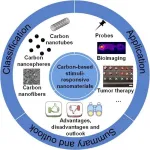(Press-News.org) Key takeaways
A targeted therapy drug called vorasidenib had positive results in delaying progression of a specific form glioma, a slow-growing but deadly brain cancer.
In a study of 331 people with the disease, the drug was effective in lengthening the period of time before the patients’ cancer worsened, and with no observed adverse effects.
New treatment approaches for glioma are needed because current treatments, including chemotherapy and radiation, can cause neurological deficits.
In an international study co-led by UCLA, scientists have shown that a new targeted therapy drug can extend the amount of time people with a subtype of glioma are on treatment without their cancer worsening. The finding suggests a possible new treatment option for people with the slow-growing but deadly brain tumor.
The team found the drug vorasidenib more than doubled progression-free survival in people with recurrent grade 2 glioma with IDH1 and IDH2 mutations. Compared with people who received a placebo, those who took vorasidenib went for nearly 17 more months without their cancer worsening, delaying the time before they needed to begin chemotherapy and radiation.
The results were published in the New England Journal of Medicine and presented today at the annual meeting of the American Society Clinical Oncology in Chicago.
The type of glioma studied in the paper, recurrent grade 2 glioma with IDH1 and IDH2 mutations, tends to affect younger people, often those in their 30s. The current standard treatment, a combination of radiation and chemotherapy, can cause neurological deficits that make it hard for patients to learn, remember new things, concentrate or make everyday decisions — all of which can be especially challenging for people who have young families or are in the early years of their professional lives.
Dr. Timothy Cloughesy, a professor of neuro-oncology at the David Geffen School of Medicine at UCLA and co-senior author of the study, said the availability of a treatment that enables patients to go for longer periods of time between chemotherapy and radiation treatments could have a major impact.
“We’re always concerned about the delayed effects of radiation,” said Cloughesy, who is also a member of the UCLA Jonsson Comprehensive Cancer Center. “Having the ability to hold off on getting radiation therapy to the brain with an effective therapy is really critical and very meaningful to this population of patients.”
Vorasidenib is classified as a dual inhibitor of mutant IDH1/2, meaning that it prevents the formation and accumulation of the onco-metabolite 2-Hydroxyglutarate, or 2-HG, that occurs when genetically altered versions of two enzymes, IDH1 and IDH2, are present in a tumor. 2-HG is thought to be responsible for the formation and maintenance of IDH-mutant gliomas.
The study is also the first clinical trial to analyze a targeted therapy drug specifically developed to treat brain cancer.
Targeted therapies are designed to target specific molecules that are involved in the growth and spread of cancer cells. Unlike chemotherapy and other therapies that can affect both cancerous and healthy cells, targeted therapies only attack cancer cells with the mutated target while minimizing damage to normal cells.
While there has been great progress in using targeted therapies to treat many types of cancer, development of targeted therapies for brain tumors has been especially challenging because of the difficulty of getting through the blood-brain barrier. Vorasidenib is a brain-penetrant inhibitor, which means that it has the ability to cross the blood-brain barrier.
The study involved 331 people aged 12 and older who had been diagnosed with recurrent grade 2 glioma with the IDH1 and IDH2 mutations and who had undergone brain tumor surgery. From that group, 168 were randomly assigned to receive vorasidenib and 163 received placebos.
Among those who received vorasidenib, the disease did not progress for an average of 27.7 months, significantly longer than the 11.1 months for those who received the placebo. And among those who received vorasidenib, 85.6% went for 18 months before their next treatment, while 83.4% went for 24 months between treatments.
The disease progressed in just 28% of people receiving vorasidenib, compared to 54% of those receiving placebos. And as of September 2022, which was 30 months after the study began, 72% of patients who were in the vorasidenib group were still taking the drug and their disease had not progressed.
For patients who were originally in the placebo group whose cancer began to progress during the study, doctors permitted a switch to vorasidenib. The researchers observed limited adverse side effects from vorasidenib. “This is the first targeted treatment that shows unequivocal efficacy in this population and is precedent-setting for this disease,” Cloughesy said.
Benjamin Ellingson, director of the UCLA Brain Tumor Imaging Laboratory and a member of the Jonsson Cancer Center, was a key participant in the research that led to the clinical trial. He was involved in the radiographic evaluation of tumors in the study, which confirmed that there was a benefit of the targeted therapy. The study’s first author is Dr. Ingo Mellinghoff of Memorial Sloan-Kettering Cancer Center. The co-senior author is Dr. Patrick Wen of the Dana-Farber Cancer Institute.
The study was sponsored by Servier Pharmaceuticals, which manufactures vorasidenib. The drug has not yet been approved by the FDA for clinical use.
END
New drug delays progression of glioma, a deadly brain cancer
Study is first clinical trial analyzing a targeted therapy drug specifically developed to treat brain tumors
2023-06-04
ELSE PRESS RELEASES FROM THIS DATE:
University of Sydney launches innovative research fellowship scheme to tackle global challenges
2023-06-04
An unprecedented investment by the University of Sydney, Australia will support up to 40 new continuing positions, empowering the world’s most talented emerging researchers to undertake innovative research to address some of the biggest challenges of our time.
A $100 million investment and a cornerstone of the University’s 2032 Strategy, the Sydney Horizon Fellowship scheme is the first of its kind in Australia and among the most generous university fellowships in the world.
“The Sydney ...
Real-world data suggests stopping immunotherapy after two years is reasonable in patients with advanced lung cancer
2023-06-04
CHICAGO – Over the past decade, the approval of immune checkpoint inhibitors has revolutionized treatment for patients with advanced lung cancer, helping many live longer lives and improving overall survival for the disease. However, an important question has remained unanswered: How long should a patient with advanced non-small cell lung cancer (NSCLC), who receives immunotherapy as part of their initial treatment, continue with treatment?
A new retrospective cohort study, published today in JAMA Oncology and presented at the 2023 American Society of Clinical Oncology (ASCO) Annual Meeting (Abstract ...
Association of immunotherapy duration with overall survival in advanced non–small cell lung cancer – this study is being released to coincide with a poster presentation at the 2023 ASCO annual meeting
2023-06-04
About The Study: The findings of this study provide reassurance that for patients with advanced non–small cell lung cancer whose disease is still responding to immune checkpoint inhibitor therapy at two years, stopping therapy and monitoring rather than continuing immunotherapy indefinitely is a reasonable strategy with sustained clinical benefit.
Authors: Lova Sun, M.D., M.S.C.E., of the Perelman School of Medicine at the University of Pennsylvania in Philadelphia, is the corresponding author.
To access the embargoed study: Visit our For The Media website at this link https://media.jamanetwork.com/
(doi:10.1001/jamaoncol.2023.1891)
Editor’s ...
The promise of novel FolRα-targeting antibody drug conjugate in recurrent epithelial ovarian cancer
2023-06-03
Presented today by VHIO’s Ana Oaknin at the 2023 ASCO Annual Meeting, 2-6 June (Chicago, IL), updated dose expansion data of the STRO-002-GM1 global phase I study* show promise of FolRα-targeting antibody drug conjugate (ADC) luveltamab tazevibulin in patients with recurrent FolRα-expressing epithelial ovarian cancer.
80% of patients included in this study presented with FolRα expression levels higher than 25%. The overall response rate among these patients was 43.8% in the dose expansion cohort, with a median duration of response ...
Carbon-based stimuli-responsive nanomaterials: classification and application
2023-06-03
Carbon-based stimuli-responsive nanomaterials are gaining much attention due to their versatility, including disease diagnosis and treatment. They work under endogenous (pH, temperature, enzyme, and redox) or exogenous (temperature, light, magnetic field, ultrasound) stimuli. Carbon-based stimuli-responsive nanomaterials can be used as smart materials with dynamically tunable physicochemical properties in response to changes in internal or external environmental stimuli. Their diverse combinations of nanostructures and molecular designs, as well as functional ...
ASCO: Targeted therapy induces responses in HER2-amplified biliary tract cancer
2023-06-03
ABSTRACT: 4008
CHICAGO ― HER2-targeted bispecific antibody zanidatamab demonstrated durable responses in patients with treatment-refractory HER2-positive biliary tract cancer (BTC), researchers from The University of Texas MD Anderson Cancer Center reported at the 2023 American Society of Clinical Oncology (ASCO) Annual Meeting. The study results also were published today in The Lancet Oncology.
In the first cohort of the global Phase II HERIZON-BTC-01 trial, which included 80 patients with HER2-positive tumors, the confirmed objective response rate (cORR) was 41% with a median duration of response (DOR) of 12.9 months at a median follow-up of 12.4 months. ...
Children with drug-resistant epilepsy live longer after cranial surgery
2023-06-03
Survival rate beyond 10 years in children with drug-resistant epilepsy (DRE) was highest after cranial epilepsy surgery and lowest when treated only with antiseizure medications, according to a study published in The Lancet Child and Adolescent Health. This large, retrospective study was the first to compare long-term survival in children with DRE among cohorts treated with medications only, vagus nerve stimulation plus medications, and cranial epilepsy surgery plus medications. Results show that risk of early death was reduced by over 80 percent after surgery and by 40 percent after ...
Can movie reviews predict box office success?
2023-06-03
When one thinks of movie reviews, one might see them as harbingers of success or failure at the box office. Some researchers have previously found that both positive and negative reviews correlate to box office revenues, and the effect of negative reviews diminishes over time.
However, researchers at the University of California, Davis, suggest that is not the case.
Researchers analyzed pre-release commentary and opening weekend box office revenue, turning the impact of movie reviews on its head and revealing an unexpected harbinger of failure phenomenon in the movie industry.
The study, ...
For advanced, HER2-amplified bile duct cancers, antibody treatment trial shows promising results
2023-06-03
Bile duct cancers are uncommon and aggressive types of gastrointestinal cancer. They include cholangiocarcinomas, which can form inside or outside of the liver, as well as cancers of the gallbladder, and are highly likely to cause serious disease or prove fatal.
Bile duct cancers affect the biliary tract, which consists of organs and ducts that make and store bile and release it into the small intestine. They are known as “silent” cancers, because there are usually no symptoms until they reach later stages. Surgery can be effective if bile duct cancer is caught early, ...
Startups to unveil cutting-edge point-of-care technologies at Boston medtech event
2023-06-02
June 2, 2023
Contact:
Emily Gowdey-Backus, 978-934-3369 or Emily_GowdeyBackus@uml.edu
Nancy Cicco, 978-934-4944 or Nancy_Cicco@uml.edu
Startups to unveil cutting-edge point-of-care technologies at Boston medtech event
Medtech and life sciences entrepreneurs and investors forging the future of health care will come together Tuesday, June 6, to showcase pioneering technologies and grow the region’s medtech ecosystem.
The 2023 Point of Care Showcase and Pitch Event will be a free, in-person program beginning at 2 p.m. at Mintz, 1 Financial Center, 40th Floor, Boston, to introduce ...
LAST 30 PRESS RELEASES:
Study finds Earth may have twice as many vertebrate species as previously thought
NYU Langone orthopedic surgeons present latest clinical findings and research at AAOS 2026
New journal highlights how artificial intelligence can help solve global environmental crises
Study identifies three diverging global AI pathways shaping the future of technology and governance
Machine learning advances non targeted detection of environmental pollutants
ACP advises all adults 75 or older get a protein subunit RSV vaccine
New study finds earliest evidence of big land predators hunting plant-eaters
Newer groundwater associated with higher risk of Parkinson’s disease
New study identifies growth hormone receptor as possible target to improve lung cancer treatment
Routine helps children adjust to school, but harsh parenting may undo benefits
IEEE honors Pitt’s Fang Peng with medal in power engineering
SwRI and the NPSS Consortium release new version of NPSS® software with improved functionality
Study identifies molecular cause of taste loss after COVID
Accounting for soil saturation enhances atmospheric river flood warnings
The research that got sick veterans treatment
Study finds that on-demand wage access boosts savings and financial engagement for low-wage workers
Antarctica has lost 10 times the size of Greater Los Angeles in ice over 30 years
Scared of spiders? The real horror story is a world without them
New study moves nanomedicine one step closer to better and safer drug delivery
Illinois team tests the costs, benefits of agrivoltaics across the Midwest
Highly stable self-rectifying memristor arrays: Enabling reliable neuromorphic computing via multi-state regulation
Composite superionic electrolytes for pressure-less solid-state batteries achieved by continuously perpendicularly aligned 2D pathways
Exploring why some people may prefer alcohol over other rewards
How expectations about artificial sweeteners may affect their taste
Ultrasound AI receives FDA De Novo clearance for delivery date AI technology
Amino acid residue-driven nanoparticle targeting of protein cavities beyond size complementarity
New AI algorithm enables scientific monitoring of "blue tears"
Insufficient sleep among US adolescents across behavioral risk groups
Long COVID and recovery among US adults
Trends in poverty and birth outcomes in the US
[Press-News.org] New drug delays progression of glioma, a deadly brain cancerStudy is first clinical trial analyzing a targeted therapy drug specifically developed to treat brain tumors




